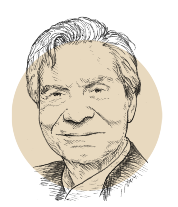The United States is founded on a widely shared myth drawn from the Declaration of Independence: the right to the “pursuit of happiness,” an expression we owe to Thomas Jefferson and that was taken up in France by Saint-Just in 1793 (“Happiness is a new idea in Europe”). All American citizens therefore believe or are supposed to believe that, by their individual effort alone, they can improve their condition, whatever their cultural or social origins. This American dream has from the beginning attracted the immigrants who have made up the nation. It also makes it possible, in theory, for men and women of infinitely diverse backgrounds, cultures, and beliefs, to live together. The Constitution is their social contract, the market economy is their Jacob’s Ladder, and little is expected of the federal government in Washington D.C. This is quite contrary to what we find in France. This mythology (every nation is founded on a myth) works well, as long as economic growth supports its legitimacy; a degree of prosperity, even if unequally shared, makes it possible to believe that the promised happiness is within reach for oneself and one’s children. But when the machine breaks down, the dream dissipates and social fractures emerge with extreme violence. The most flagrant of these fractures today is racial discrimination, which is largely coextensive with inequalities in income, health, and education.
African-Americans and immigrant communities such as Latinos have borne the main brunt of the Covid-19 pandemic, and proportionally are affected twice as much as whites. This is not an unfortunate anomaly, but something that reveals their social situation. They are the poorest Americans, and the most vulnerable to untreated chronic illnesses such as diabetes because, apart from emergency room care, they have limited access to quality healthcare. In addition to this, when unemployment strikes more than 20% of the active population, these ethnic “minorities” are the first to be let go, often without unemployment insurance. As a result, they rely on the charity of churches and philanthropic foundations and, depending on the state, some local aid. Of course, there is no more slavery, discrimination is illegal, and a third of African-Americans and many Latinos have become middle class or better; but the majority remain part of a sub-proletariat despised by many whites.
At the beginning of summer, two tragic and symbolic incidents shook the country and sparked urban revolts. The first seemed insignificant, but it is revelatory. A white woman walking her dog in Manhattan’s Central Park found herself being criticized by an African-American man for not keeping her dog on a leash, which is mandatory. She called the police to report an “African-American” who “came out of the bush” and threatened her. The Black male as eternal threat to white women is a deep-seated fantasy. The same week, a white policeman in Minneapolis killed a Black man, George Floyd, who was not even resisting arrest, and did it without showing any emotion. The indignation that followed enflamed all of America, with echoes in France, under the banner of Black Lives Matter. This crystallization, in the same moment, of illness, unemployment, and police violence set off riots that are reminiscent of those in the 1960s and 1970s: riots of despair, which of course attract hoodlums and anarchist groupuscules. But in this case the riots also included white liberal sympathizers. Hoodlums, anarchists, and antifas, despite their intentions, play into the hands of white supremacists, as denouncing the violence of rioters makes it possible to avoid the question of the deep causes of despair.
Calling for a return to order, Donald Trump is now trying, despite the reality of the context, to dissimulate the existence of racism, inequality, and police violence, as well as his own inability to manage the pandemic. Remember that he first denied it, and then tried to foist it upon local authorities, declaring that it was not his problem. Rather than preaching reconciliation and national unity, as did Franklin Roosevelt in the 1930s and Barack Obama after the economic collapse of 2008, Trump is fanning the flames of discord, stirring up his white male supporters, and threatening to send the army into cities. When the symbolic total of 100,000 deaths from Covid-19 was reached, he went off to play golf without a word of compassion.
In the future, whether this strange president is re-elected or ousted, it is clear that, to save themselves and restore the right to the pursuit of happiness, Americans and those who lead them will have to revise the social contract that unites them with the state. Without copying French-style social democracy, Americans will have to come a little closer to it. The absence of the federal government when society is threatened by crisis, in health policy, economics, and race relations – as well as by the challenge of China – fundamentally threatens the American dream. No one will believe in it anymore, whether within America or on the world stage, where the United States has now lost its leadership role. Barack Obama understood this when he extended healthcare to all and showed respect for foreign cultures. His record was mixed; the crisis of 2008 was probably not serious enough for most Americans to become aware that their country was on the verge of decline. Now it is on the verge of implosion, of self-destruction. There is still time to save the American dream, but who will tell voters the whole truth next November? For Trump, everything is about Trump. Will Biden be able to galvanize the people? No election will have been as decisive for the American people and for the rest of us since Abraham Lincoln was elected in a stand against the slave-owning South. Europe is on the sidelines, but the United States worries us.
Editorial published in the August 2020 issue of France-Amérique. Subscribe to the magazine.












